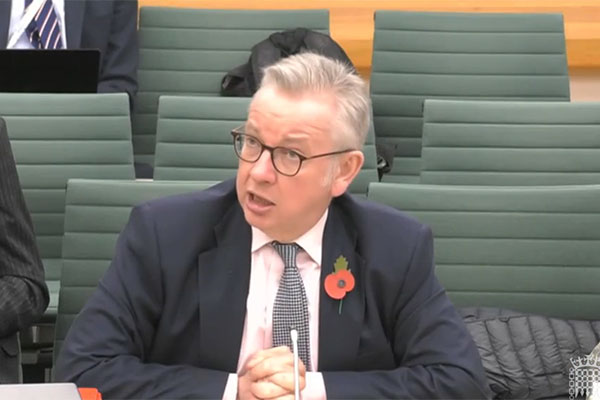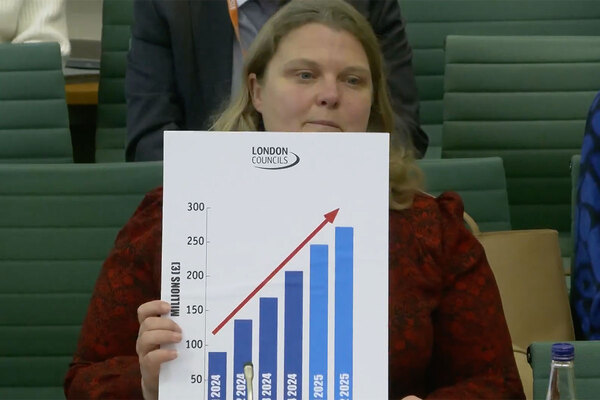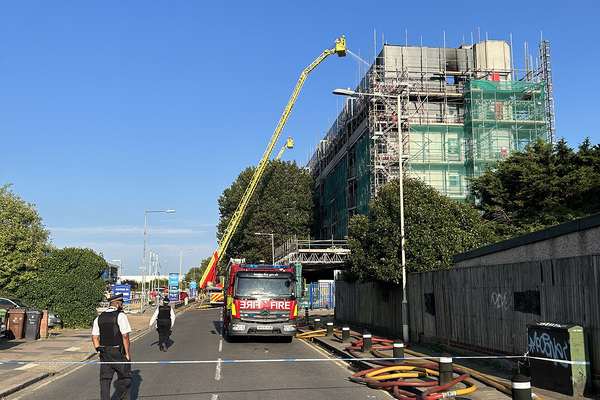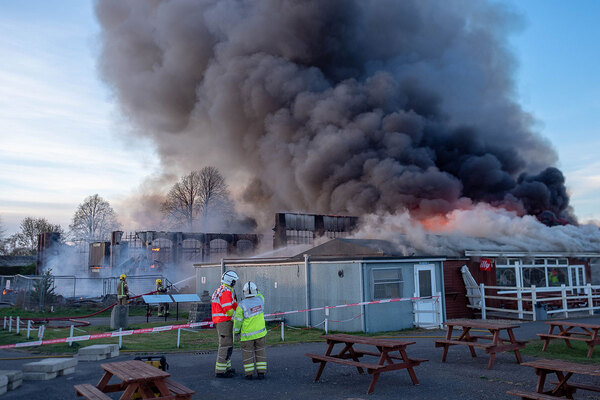Gove says builders must sign or find ‘new line of work’ amid questions over scope of cladding contracts
Michael Gove has warned builders that failure to sign new contracts agreeing to cladding remediation will mean they have to “find another line of work”.
In a debate in the House of Commons yesterday, the housing secretary also faced questions about whether he had watered down obligations to be imposed in the contracts published yesterday.
Mr Gove has threatened to strip large builders of the right to gain planning permission or building control approval if they do not sign the contracts, which commit them to remedying defects on homes they developed by 13 March.
He told MPs: “Anyone who fails to sign the contract will be prohibited from carrying out future development and from receiving building control sign-offs for buildings under construction. A developer who fails to sign this contract will have to find another line of work.”
However, Lisa Nandy, shadow housing secretary for Labour, responded by questioning whether the terms of the contract had been diluted.
After Mr Gove left office in the summer, during the tumultuous downfall of Boris Johnson, his successor Greg Clark agreed some concessions with developers to the original draft contract.
Mr Gove is understood to have initially rejected these, leading to an impasse, but Ms Nandy said yesterday they appear to have been added back into the final version.
They include a strict limit on the liability of the works to life safety issues and limits around the liability for projects developed in joint venture with others.
Ms Nandy said: “A quick read of the contract on Gov.uk appears to confirm that he has retreated from his previous position and returned to the provisions agreed with his predecessors last summer, which, he said on retaking office, simply were not good enough.”
Leaseholders are understood to also have significant concerns about a term in the contract that absolves developers for responsibility for interim safety costs, such as fire alarms and waking watches.
At some blocks, these can be substantial, with waking watches at one development in north London costing each household more than £1,500 a month at one stage.
In some instances, developers have already agreed to cover waking watch costs, but residents are concerned that a contract saying they are not responsible for doing so may undermine efforts to secure these commitments.
Responding to Ms Nandy, Mr Gove said: “The contract that we are publishing is the result of detailed negotiations with developers. Developers made a number of points that seemed fair and to reflect their responsibilities. We also robustly rejected a number of points that they made during the contract negotiation, so as to ensure that we receive payment from them as quickly as possibly for the work required.”
The contracts cover properties developed by large builders contacted by the government and asked to sign. This means that, if fully taken up, they will provide funding for an estimated 1,500 dangerous properties that are taller than 11 metres.
With more than 10,000 buildings expected to need work, this leaves a large number which will still require state funding or another source of redress to fund their remediation without leaseholders paying.
Mr Gove added: “I will consult in due course on how we expand the responsible actors scheme to make sure that we capture all those who built unsafe buildings and should now fix them.”
The government wrote to the manufacturers of cladding and insulation products last year, telling them it would seek funding from them to help remedy the defective products.
This process has not yet moved forward, but a source at the Department for Levelling Up, Housing and Communities (DLUHC) told Inside Housing: “No options are off the table and we are working to identify and pursue companies that fail to do the right thing, including through the courts if necessary.”
Clive Betts, Labour MP and chair of the LUHC Committee, which scrutinises the work of the department, asked whether there would be any funding to help social landlords meet the cost of fire safety costs.
“Apart from [aluminium composite material] cladding, there is no help at all for social housing providers. Why can the secretary of state not remedy this unfairness?” he asked.
“I am well aware of the pressures on the social housing sector and of the need to work collectively to ensure it can discharge its obligations. I hope to say more about how we can do so in the weeks ahead,” Mr Gove replied.
Florence Eshalomi, Labour MP for Vauxhall in south London, asked about the failure to introduce evacuation plans for disabled residents of high rises, as recommended by the Grenfell Tower Inquiry in 2019.
She said: “In December, a constituent emailed me to say that his young relative, who was in a wheelchair, had died when a fire broke out in her flat because she had no way to escape. Avoidable tragedies such as that will keep happening until we make the change. How can this be acceptable?”
Mr Gove replied: “Critically, one recommendation from the inquiry – the need for personal emergency evacuation plans – is one that the government have not yet met. I have been working with my colleagues in the Home Office to make sure that we do, but I understand her exasperation. We need to move more quickly to give disabled people the certainty that they will be safe.”
The Home Office announced last year that it intends not to follow the recommendation, but to introduce the Emergency Evacuation Information Sharing system instead for a limited category of buildings with known fire safety defects.
This would involve sharing the location of disabled residents with the fire services so that they could attempt rescues. Residents in blocks without known defects would be required to continue to rely solely on stay put.
This policy is currently subject to a judicial review application from disability rights campaigners, with a verdict expected shortly.
Asked how quickly he plans to move forward with his promise to abolish leasehold ownership in the UK, Mr Gove said: “On leasehold, the plan is for a bill to be introduced in the [King’s] Speech and then rapid progress through this House. I do not know whether in the other place there might be one or two people who are pro-feudalism, but I hope they will recognise that this House will be speaking with a united voice.”
Sign up for our fire safety newsletter
Already have an account? Click here to manage your newsletters












